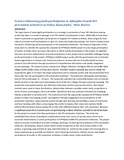| dc.description.abstract | The importance of meaningful participation as a strategy in prevention of new HIV infections among youths has been a consistent message in all HIV related commitments to date. While efforts have been made to promote young people’s participation in targeted HIV related activities, fewer programs have tried to promote youth participation as part of a more encompassing strategy. Not much is known about the factors influencing youth participation in HIV prevention initiatives. The research objectives of this study were to; identify the approaches adopted by APHIAplus KaMili project to encourage participation of youths in Dallas slums; to assess the extent to which youths participated in the project; to establish the socio-economic determinants of youth participation in the project and to establish challenges facing youth participation in the project. APHIAplus KaMili project works with the government and community based organizations in Eastern and Central provinces to increase the use of quality health services, products and information through provision of comprehensive information and quality integrated service packages.
The research study covered four villages; Matakari, Kathigari, Mbona and Dallas Mjini
villages within Dallas slums in Embu west District. Stratified random sampling was used to divide the respondents aged 15-24 years into equal proportions and to separate youths who had participated from those who had not participated in HIV prevention initiatives. The researcher anticipated interviewing a total of 104 youths aged 15 – 24 years. The researcher selected two community leaders and community health workers as key informant interviewees from all the four villages through purposive sampling. The researcher used questionnaires, key informant interviews and focus group discussions. Descriptive statistics were used to show distributions, relationships between variables under study, proportions in terms of texts, percentages, charts and tables. Qualitative data was analyzed manually and emerging themes presented in narrative form.
The study found that the approaches adopted by APHIAplus KaMili project include;
encouraging youths’ participation through engagement and participation in HIV prevention
initiatives; supporting the youths through peer learning and instilling a sense of community and local bonding with others; encouraging the youths to express their views and opinions freely without discrimination and providing the youths with skillful training for their HIV prevention. However a significant proportion of youths were not participating in these initiatives and efforts should be made by the project to ensure that they participate in the HIV prevention initiatives. The study also established that nature of residence; employment status and source of income were critical socio-economic determinants of youth participation in APHIAplus KaMili HIV prevention initiatives. The project needs to ensure involvement of youths in design, planning, monitoring and evaluation of HIV prevention initiatives. Developing a reward system which entails recognition of the most active youths in the project, expanding opportunities for jobs and
internships for youths by the project and ensuring that as many youth groups as possible are linked to micro financing institutions will also ensure meaningful participation of youths in HIV prevention initiatives in Dallas slums, Embu west District. | en |


